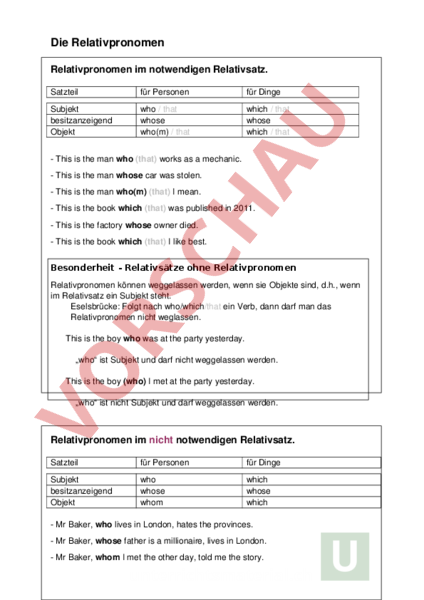Arbeitsblatt: English Plus 3 Unit 2
Material-Details
Theorie zu Relativpronomen
Englisch
Grammatik
8. Schuljahr
3 Seiten
Statistik
166732
483
1
09.12.2016
Autor/in
Andreas Manetsch
Land: Schweiz
Registriert vor 2006
Textauszüge aus dem Inhalt:
Die Relativpronomen Relativpronomen im notwendigen Relativsatz. Satzteil für Personen für Dinge Subjekt besitzanzeigend Objekt who that whose who(m) that which that whose which that This is the man who (that) works as mechanic. This is the man whose car was stolen. This is the man who(m) (that) mean. This is the book which (that) was published in 2011. This is the factory whose owner died. This is the book which (that) like best. Besonderheit Relativsätze ohne Relativpronomen Relativpronomen können weggelassen werden, wenn sie Objekte sind, d.h., wenn im Relativsatz ein Subjekt steht. Eselsbrücke: Folgt nach who/which/that ein Verb, dann darf man das Relativpronomen nicht weglassen. This is the boy who was at the party yesterday. „who ist Subjekt und darf nicht weggelassen werden. This is the boy (who) met at the party yesterday. „who ist nicht Subjekt und darf weggelassen werden. Relativpronomen im nicht notwendigen Relativsatz. Satzteil für Personen für Dinge Subjekt besitzanzeigend Objekt who whose whom which whose which Mr Baker, who lives in London, hates the provinces. Mr Baker, whose father is millionaire, lives in London. Mr Baker, whom met the other day, told me the story. The shop, which sells the books, is closed today. The favourite shop, whose windows are painted red, is closed today. Mr Greens shop, which like best, is closed today. Relativadverbien Anstelle von Relativpronomen mit Präposition kann man auch ein Relativadverb verwenden. Der Satz ist so oft einfacher zu verstehen. This is the shop in which bought my bike. This is the shop where bought my bike. Relativadverb Bedeutung Beispielsatz when ein Zeitpunkt wird näher beschrieben the day when we met him where ein Ort wird näher beschrieben the place where we met him why ein Grund wird näher beschrieben the reason why we met him Die KommaRegel 1. Nicht notwendige Relativsätze Ein nicht notwendiger Relativsatz ist ein Satz, der eingeschoben ist: „My house, which has blue door, needs painting. Die schräggedruckten Wörter sind eine Zusatzinformation, die weggelassen werden kann. Im eigentlichen Satz (My house needs painting.) geht es darum, dass das Haus gestrichen werden muss, die blaue Tür beschreibt dieses Haus nur näher. Benutze Kommas, um die nicht notwendige Elemente vom restlichen Satz abzutrennen. 2. Notwendige Relativsätze Ein notwendiger Relativsatz ist unentbehrlich für den Sinn des Satzes. „My house which has blue door needs painting. Hier ist die blaue Tür ganz wichtig, denn in diesem Satz habe ich mehrere Häuser und nur das Haus mit der blauen Tür soll gestrichen werden. Notwendige Relativsätze werden NICHT durch Kommas abgetrennt. Ein notwendiger Relativsatz ist für die Bedeutung des Satzes unentbehrlich und darf deswegen auch nicht weggelassen werden, da sich der Sinn des Satzes sonst dramatisch ändern würde. Fill in the gaps! 1. This is the boy had an accident. 2. Yesterday saw car was really old. 3. Mandy is the girl met on Friday. 4. havent seen Frank, brother is five, for long time now. 5. The robber stole the car the lady parked in front of the bank. 6. This is the man house is on fire. 7. Can talk to the girl is sitting on the bench? 8. The book you gave me is great. 9. She likes hamburgers are hot. 10. This is the man works as mechanic. 11. This is the man bike was stolen. 12. This is the man mean. 13. This is the book was published in 2010. 14. This is the shop owner died. 15. This is the book like best. 16. Mr Bob, lives in London, hates the provinces. 17. Mr Bob, father is millionaire, lives in London. 18. Mr Bob, met the other day, told me the story. 19. The shop, sells the books, is closed today. 20. The favourite shop, windows are painted red, is closed today. 21. Mr Greens shop, like best, is closed today. Füge beide Sätze zusammen! 1) We live in flat. It is not far from the station. 2) This is Tom. He helped me with my homework. 3) This is great video. We want to watch it. 4) This is the new car. My brother bought it in New York. 5) The Patels are an Indian family. Their friends live in Bradford. 6) The tourists go to the Tower. They often buy souvenirs. 1) This is the boy who had an accident. 2) Yesterday saw car which was really old. 3) Mandy is the girl I met on Friday. 4) havent seen Frank, whose brother is five, for long time now. 5) The robber stole the car the lady parked in front of the supermarket. 6) This is the man whose house is on fire. 7) Can talk to the girl who is sitting on the bench? 8) The book you gave me is great. 9) She likes hamburgers which are hot. 1021 vgl Theorieblatt 1. 2. 3. 4. 5. 6. We live in flat that/which is not far from the station. This is Tom who helped me with my homework. This is great video which/that/- we want to watch. This is the new car which/ that/- my brother bought in New York. The Patels are an Indian family whose friends live in Bradford. The tourists who often buy souvenirs go to the Tower. The tourists who go to the Tower often buy souvenirs. 1. 2. 3. 4. 5. 6. Where What Who Whom Whose
